|
| Excelsior Class |
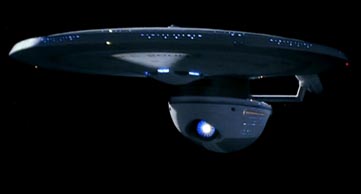
|
| USS Rhode Island |
Category: Heavy Cruiser
Expected Duration: 70 years Time Between Resupply: 3 years Time Between Refit: 5 years PersonnelOfficers: 115 Enlisted Crew: 450 Marines: 144 Passengers: 110 SpeedCruising Velocity: Warp 6 Maximum Velocity: Warp 8.6 Emergency Velocity: Warp 9.3 (for 12 hours) DimensionsLength: 467 metres Width: 185 metres Height: 100 metres Decks: 24
| Constitution Class |
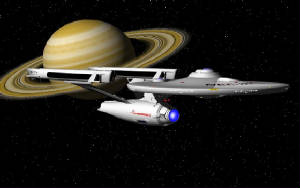
|
| USS Apollo |
Category: Explorer
Expected Duration: 20 years
Time Between Resupply: 2 years
Time Between Refit: 4 years
Personnel
Officers: 100
Enlisted Crew: 550
Marines: 100
Passengers: 100
Speed
Cruising Velocity: Warp 7 Maximum Velocity: Warp 8.8
Emergency Velocity: Warp 9.1 (for 12 hours)
Dimensions
Length: 400 metres
Width: 175 metres
Height: 90 metres
Decks: 20
In the late 2260s to early 2270s, the Constitution-class starships underwent a major refit program.
The actual refitting took eighteen months of work and essentially a new vessel was built onto the bones of the old, replacing
virtually every major system. Thus the Constitution-class continued in service for a further twenty years.
Essential upgrades were made to the Constitution-class' warp systems; the old cylindrical nacelles
were replaced with new angular ones, and also the warp nacelle struts were new, as they were connected to the engineering
hull much closer to the neck than before. The engineerroughly retained its original shape — while the original hull
was essentially a conical cylinder, the refit was much more rounded. As for the interior of the hull, the most obvious upgrades
were the enlargement of the shuttle deck and landing bay, as well as the addition of a horizontal matter-antimatter intermix
chamber and a vertical intermix chamber.
New also was the installment of the double photon torpedo launcher with its rectangular housing in the
neck of the vessel. Furthermore, the saucer sectionwas considerably extended (almost 20 meters), while the rest of the surface
remained about the same. Major changes were made to the interior of the Constitution class starship; however, many
new systems were added and existing ones upgraded. Summarizing, only the internal structure of the saucer and very little
of the engineering hull and neck may have survived the 2271-upgrade.
| Miranda Class |
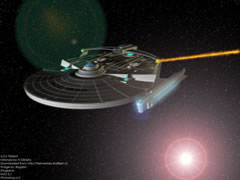
|
| USS Jupiter |
Category: Scout
Expected Duration: 120 years Time Between Resupply: 1 years Time Between Refit: 4 years PersonnelOfficers: 65 Enlisted Crew: 280 Marines: 24 Passengers: 120 SpeedCruising Velocity: Warp 6.5 Maximum Velocity: Warp 7.5 Emergency Velocity: Warp 8.7 (for 12 hours) DimensionsLength: 243 metres Width: 150 metres Height: 63 metres Decks: 12 Auxiliary CraftShuttlebays: 2
| Curry Class |
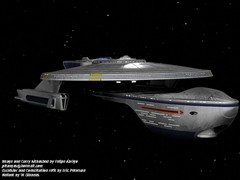
|
| USS Zeus |
Category: Transport/Cargo
Expected Duration: 100 years Time Between Resupply: 1 years Time Between Refit: 6 years PersonnelOfficers: 65 Enlisted Crew: 150 Marines: 900 Maximum (Evacuation) Capacity: 6000 SpeedCruising Velocity: Warp 6 Maximum Velocity: Warp 8 Emergency Velocity: Warp 8.5 (for 10 hours) DimensionsLength: 261.5 metres Width: 185 metres Height: 112 metres Decks: 28
Developed in the late 23rd century as a transwarp-capable cargo carrier, the Curry class was developed alongside
the Excelsior class and meant to herald in a new era of interstellar travel. Essentially, the ship is a heavily modified version
of the Excelsior. The saucer section was gutted of all scientific and diplomatic facilties, most of the crew quarters
and some of the weapons systems. The space freed was used to install a transwarp core and supporting systems with the nacelles
fastened directly to the port and starboard underside of the saucer. The neck section was modified to include a seperation
system to allow the fitting of various cargo carrier modules that were designed alongside it.
When the transwarp project failed, engineers decided it would be too costly to replace the warp coils of the
nacelles, instead opting to use nacelles developed for the Constitution class vessels. This, combined with a older model of
warp core meant that the top speed of the ship was never as fast as it's Excelsior brethren. The first Curry class was commissioned
in 2276 and since then they have become a common sight in the Federation, due to their reliability and space worthiness, a
trait they do share with the Excelsior class.
In a strange twist, the Curry class suddenly found itself looking more like an Excelsior than ever before.
Many of the retired Excelsior class vessels were recycled for the cost and labor needs& to increase fleet strength and
converted to troop/fighter/vehicle carriers. Due to the way the engineering hull connected, a second hangar bay was placed
on the bow of the vessel, and many of the hulls weapons systems and internal systems have been replaced by cargo space, comfortable
barracks, and vehicle and fighter storage facilities. When used with the Curry saucer, the ships can carry over 1,000 marines
with ground assets and a large amount of transoprts and fighters and keep them supplied for several months. In times of emergency,
they can be used to evacuate up to 6,000 personnel whilst still retaining room for their cargo. In peacetime, they have been
adopted fully by the Ground Force Command for transports, and one has been assigned to Test Fleet, allowing it to
deploy ground troops and supporing armour wherever it is needed in a time of crisis.
The Curry's are lightly armed, carrying the 4 torpedo launchers of the Excelsior hull and a small amount of
torpedoes. Ball-turret phaser emitters make up the defensive systems on the saucer, although there are several blind spots
on the underside. As such, they should be escorted by other capital ships and a heavy fighter escort whenever they are deployed.
All of the Flag rank officers have cabins on the USS Zeus.
| Olymbic Class |
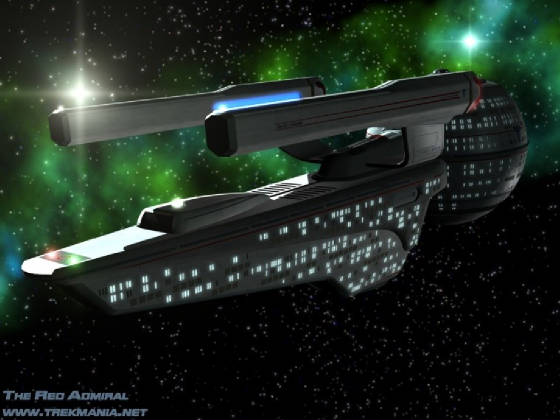
|
| USS Nightengale |
Category: Medical
Expected Duration: 60 years Time Between Resupply: 1 years Time Between Refit: 5 years PersonnelOfficers: 82 Enlisted Crew: 140 Marines: 0 Passengers: 300 Maximum (Evacuation) Capacity: 1150 SpeedCruising Velocity: Warp 6.0 Maximum Velocity: Warp 8.0 Emergency Velocity: Warp 9.0 (for 3 hours) DimensionsLength: 330.5 metres Width: 155.63 metres Height: 96 metres Decks: 24
| Orberth Class |
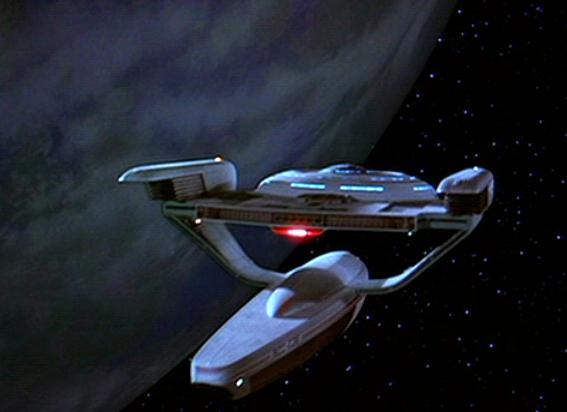
|
| USS Einstien |
Category: Science
Expected Duration: 50 years Time Between Resupply: 1.5 years Time Between Refit: 3 years PersonnelOfficers: 20 Enlisted Crew: 125 Marines: 0
Passengers: 450
Maximum (Evacuation) Capacity: 1200
SpeedCruising Velocity: Warp 5.0 Maximum Velocity: Warp 6.5
Emergency Velocity: Warp 7.3 (3 hours) DimensionsLength: 250.6 metres Width: 127.9metres Height: 82metres Decks: 18
| Centuar Class |
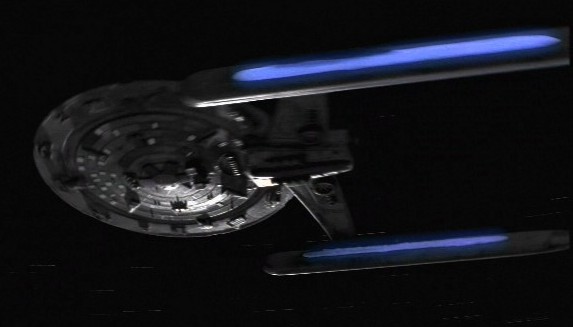
|
| USS Neptune |
Centaur Class Starship
Category: Destroyer
Expected Duration: 80 years
Time Between Resupply: 1 years
Time
Between Refit: 4 years
Personnel
Officers: 40
Enlisted Crew: 200
Marines: 24
Maximum (Evacuation) Capacity: 320
Speed
Cruising Velocity: Warp 6
Maximum Velocity: Warp 7.5
Emergency Velocity: Warp 8.6 (for 12 hours)
Dimensions
Length: 382 metres
Width: 231 metres
Height: 74 metres
Decks: 16
Designed in the early 2280s as a complement to the existing Excelsior class, the Centaur class resembles the
NX class ships that were the mainstay of Earth's Starfleet before the foundation of the Federation. The Centaur class is to the
Excelsior class the Miranda class is to the Constitution. They have the same saucer section and warp nacelles
with a lack of a secondary hull.
The original design brief was for a medium-size ship capable of performing 85% of the Excelsior's mission
capabilities while requiring a smaller crew and fewer resources and having a shorter build time. The design team borrowed
from the Miranda class concept for their design, but based the ship off of the Excelsior class components that were coming
out of the shipyards.
The ship was given a forward Shuttlebay, which also helped shield the bridge from enemy fire in case of shield
failure. This unique placement also allowed for rapid deployment of attack or rescue craft towards the ship's destination
or target. Having only the one Shuttlebay would normally mean a small complement of support craft, but the large capacity
of the bay allows it to carry a larger complement when necessary.
The ship's design is centred on the Excelsior class saucer, so the internal arrangement is similar in the
crew areas. The ship's Phaser banks are arranged with 4 on the dorsal saucer, 5 on the ventral saucer, and 1 on the aft of
the lower pod. There are two torpedo launchers on the forward side of the pod and 1 aft-firing launcher aft of the bridge
on Deck 2. To protect the bridge from any cases of a launcher jam, the launcher was placed at the end of a long extension
away from the main section of Deck 2.
Another unique feature of the design is an ejectable bottom deck, which stores the Antimatter containment
pods. The entirety of decks 15 and 16 are contained in a blister-like attachment to the bottom of the cargo/engineering section
that can be ejected from the ship in an emergency situation, which makes it easier to retrieve the antimatter later if it
doesn't detonate as a result of whatever emergency prompts the ejection. This feature is intended for use in conjunction with
a warp core ejection and thus the ship has no warp core ejection hatch on the lower hull.
The Centaur has surprising manoeuvrability for its size and era, surpassing the Miranda class. This has given
the ship a high survival rate in massed-fleet combats, though it doesn't fare quite as well in one-on-one engagements. In
this role it is an excellent fleet-support ship, being able to defend larger ships against attacks from smaller enemies and
draw the fire of large cruisers.
The Centaur has proven itself effective at border patrol and anti-pirate activities, and more recently in
the Klingon and Romulian skirmishs as a fast attack ship. It has also proven itself effective in convoy harassment
and raids, being able to use its manoeuvrability and speed to perform hit and run attacks and take minimal damage itself.
Along with its battle capabilities, the Centaur has proven a solid platform for scientific operations of varying
natures. Several Centaur class ships have been involved in planetary surveys and archaeological expeditions. Their easily
accessible cargo areas also provide an excellent capability for transporting medical supplies and scientific equipment, as
well as other supplies. It's not a cargo ship, but works well as a medium-range courier for small amounts of supplies.
| Front view of the USS Neptune |

|
|
